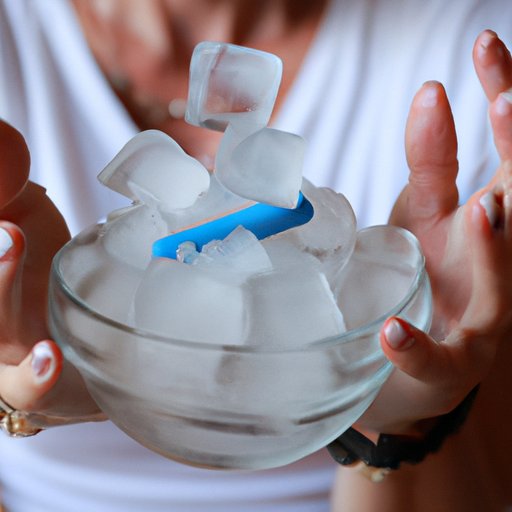Introduction
Ice addiction, also known as pagophagia, is a condition where someone craves and compulsively eats large amounts of ice. It can be caused by iron deficiency anemia, but it can also be a sign of psychological distress or even boredom. Regardless of what’s causing the addiction, it’s important to recognize the problem and find ways to stop it.

Find a Healthier Alternative to Ice
One of the best ways to stop ice addiction is to find a healthier alternative. This can be anything from frozen fruit to crunchy vegetables. Identifying healthy alternatives that are both delicious and satisfying can help replace the urge to eat ice. Additionally, making these alternatives more enjoyable can make it easier to stick to them.
Avoid Triggers that Make You Want to Eat Ice
Another way to stop ice addiction is to avoid triggers that make you want to eat ice. These triggers can vary from person to person, so it’s important to identify your own specific triggers. Once you know what they are, you can create strategies for avoiding them. This may involve changing your environment, planning ahead, or engaging in other activities when the urge to eat ice arises.
Drink Plenty of Water
Drinking plenty of water is another great way to stop ice addiction. Not only does staying hydrated help reduce cravings for ice, but it also has many other health benefits. Drinking water helps flush out toxins and boosts your energy levels, which can make it easier to resist the urge to eat ice. There are also plenty of tips for increasing your water intake, such as carrying a water bottle with you or setting reminders on your phone.
Keep Your Mouth Occupied
In addition to drinking plenty of water, keeping your mouth occupied can also help stop ice addiction. Chewing gum or sucking on hard candy can help satisfy the urge to eat ice. Other activities, such as brushing your teeth or talking on the phone, can also help keep your mouth busy. Additionally, having healthy snacks on hand can help replenish your energy and keep cravings at bay.

Talk to a Counselor or Therapist
If you’re struggling to stop ice addiction on your own, talking to a professional can be helpful. A counselor or therapist can provide valuable insight into why you’re craving ice and can help you develop strategies for overcoming it. They can also offer support and guidance during times of difficulty and can provide additional resources if needed.
Try Mindfulness Techniques
Mindfulness techniques can also be beneficial for those trying to stop ice addiction. Mindfulness involves being present in the moment and paying attention to your thoughts, feelings, and physical sensations without judgment. Practicing mindful eating can help you become more aware of when you’re feeling the urge to eat ice and can help you better understand your cravings. Mindfulness can also help reduce stress and anxiety, which can further help you manage your ice addiction.
Conclusion
Ice addiction can be difficult to manage, but with the right strategies, it is possible to overcome. Finding healthier alternatives to ice, avoiding triggers, drinking plenty of water, keeping your mouth occupied, talking to a professional, and practicing mindfulness techniques can all help stop ice addiction. Taking the time to explore these strategies and finding the ones that work best for you can be key to successfully managing your addiction.
It’s important to remember that recovery is possible, and with the right tools and support, you can take control of your ice addiction.
(Note: Is this article not meeting your expectations? Do you have knowledge or insights to share? Unlock new opportunities and expand your reach by joining our authors team. Click Registration to join us and share your expertise with our readers.)
